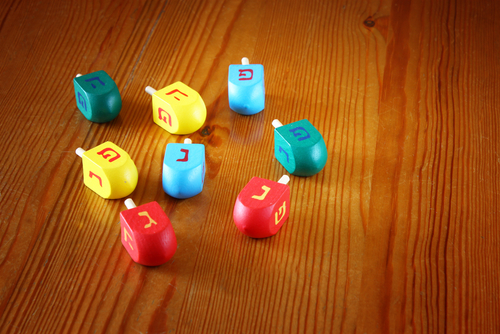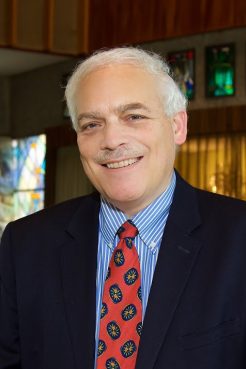The Hanukkah dreidel and America’s gambling problem
Religious institutions were not prepared for the gambling explosion. We need to catch up.

(RNS) — Hanukkah celebrates miracles of human heroism and divine Providence. A small group of Jewish holdouts against the Greek empire managed a military victory, rededicating their temple with the help of a tiny portion of oil that lasted for eight days, much longer than expected. The dreidel, a simple toy top, represents the unexpected tumble Greeks took.
The dreidel also celebrates the element of pure luck in life’s game of chance. It teaches us that life is one unending game of dreidel. Wherever you land, no matter what, you keep on spinning. Although this four-sided top has roots far removed from Judaism, the dreidel has become a valuable means of motivating new generations of Jews to stay in the game.
But with a culture of gambling overpowering America, sending our heads spinning faster than any dreidel can, it may be time to cash in our golden chocolate coins and look at the dreidel not as a tool to counter assimilation but as a reminder to defend those most vulnerable to gambling addiction.
But what could be so bad about an innocent game of dreidel? A little gambling can’t hurt anyone, right? For Jews in the shtetls of Europe, a roll of the dice was a prime feature of this dark and cold time of year, and not just on Hanukkah. Games of chance were part of the annual “Nittel Nacht” celebration on Christmas Eve long before Jews discovered the wonders of Chinese restaurants on what, for Jews, can be a long and lonely night.
RELATED: The climate bill is our generation’s moonshot. Failure is not an option.
Jewish sources are primarily negative about gambling. It was traditionally allowed, but moderation was always the key. Even with moderation, venerated authorities like Rashi and Maimonides considered it to be a form of robbery, since the losing party gives up their money against their will. Some sages even suggest that those who gamble should not be allowed to serve as witnesses.
Jews are not alone in being wary of the dangers. Many religious groups concur and so does law enforcement. Gambling is still considered officially a “vice,” right alongside prostitution, illegal drugs and porn. But few government officials and religious leaders have been inclined of late to speak out against gambling’s unconstrained growth.
That needs to change.
It’s time for organized religion to take a much more active role in raising public awareness to the increasing toxicity of the current gambling craze.
A recent New York Times expose on sports gambling explains how, since the Supreme Court opened the door to widespread sports betting in 2018, an onslaught of wagering has turned America into a continent-wide casino. What happens in Vegas no longer stays in Vegas: It’s happening on every couch and easy chair and barstool in America. Every football game — no, every play — is making someone, somewhere, much richer, and someone else, more to the point, much poorer.
The Times’ reporting demonstrates how gambling companies and sports leagues have had a field day with state lawmakers and regulators. Customers, including those underage, are being lured into bets they can’t afford. And, the article adds, “Tools to make it easier to quit — some run by gambling companies, others by states — do not always work.”
In the category of “this can’t end well,” Caesars struck deals recently with Michigan State and Louisiana State University for sports betting partnerships. As if college students weren’t young enough marks, a recent Pew report indicates that addiction is hitting hard even among those still in high school. Keith Whyte, executive director of the Council on Problem Gambling, told Pew, “We believe that the risks for gambling addiction overall have grown 30% from 2018 to 2021, with the risk concentrated among young males 18 to 24 who are sports bettors.”
The sports gambling business has been booming since the pandemic. Forbes reports that for the first half of 2022, revenue for sports betting totaled a little more than $3 billion compared with $4.3 billion for all of last year. Morgan Stanley forecasts revenue to reach $7 billion by 2025. And in 2021 Americans bet $57.2 billion on sporting events, a year-over-year increase of 165%.
Religious institutions were not prepared for this. It suddenly just appeared. Before we knew it, we were being inundated with cute ads with the Mannings and in-game prop bets on ESPN. While those least able to resist the temptations were losing their shirt, their local place of worship was throwing in the towel. Some even continue to embrace gambling in programming and fundraising, surpassing simple bygone bingo nights of the past century.
So, what can religious groups do about this? For one thing, stop glorifying betting. Be a counterpoint. Be a pain in the neck. If we are promoting small-change gambling at our events, let’s include disclaimers. Let’s put out information for recovery support services. It might make us a little less “cool” but I’ll take that exchange if it will enable us to fulfill our obligation as a moral voice espousing a faith tradition that promotes good health practices. Religious institutions should always be looking out for the most vulnerable in everything we do.
But we also need to roll up our sleeves and take on some of the big boys, in the press, in state legislatures and in Congress. We need to highlight the risks of the whole country becoming Vegas.
We can address the risks without overstating them. We understand that Sodom and Gomorrah were not destroyed because of a poker game in the back, that perhaps this crisis does not equal in severity the approximately 100,000 who die from drug overdoses each year. But gambling disorder affects 1% of Americans. Three million victims are not nothing — these are folks who can’t stop without our help. We need to offer that help, which means advocating that what happens in Vegas remains in Vegas.
This Hanukkah, when I spin the dreidel I’ll be thinking of those 3 million people, who are soon to be joined by many millions more if current trends are allowed to continue unabated. We need to understand the growing dangers around us and deal ourselves into a game with far higher stakes than a four-sided Hanukkah top.
(Rabbi Joshua Hammerman is the spiritual leader of Temple Beth El in Stamford, Connecticut, and the author of “Mensch-Marks: Life Lessons of a Human Rabbi” and “Embracing Auschwitz: Forging a Vibrant, Life-Affirming Judaism that Takes the Holocaust Seriously.” The views expressed in this commentary do not necessarily reflect those of Religion News Service.)

No comments:
Post a Comment